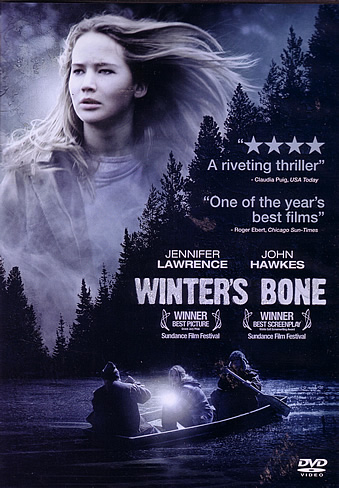JOY (2015)
Genre: Drama
Director: David O. Russell
Cast: Jennifer Lawrence, Robert De Niro, Bradley Cooper, Edgar Ramirez, Isabella Rossellini, Diane Ladd, Virginia Madsen
Runtime: 2 hrs 4 mins
Rating: PG13 (Brief Coarse Language)
Released By: 20th Century Fox
Official Website:
Opening Day: 7 January 2016
Synopsis: JOY is the wild story of a family across four generations centered on the girl who becomes the woman who founds a business dynasty and becomes a matriarch in her own right. Betrayal, treachery, the loss of innocence and the scars of love, pave the road in this intense emotional and human comedy about becoming a true boss of family and enterprise facing a world of unforgiving commerce. Allies become adversaries and adversaries become allies, both inside and outside the family, as Joy’s inner life and fierce imagination carry her through the storm she faces. Jennifer Lawrence stars, with Robert De Niro, Bradley Cooper, Edgar Ramirez, Isabella Rossellini, Diane Ladd, and Virginia Madsen. Like David O. Russell’s previous films, Joy defies genre to tell a story of family, loyalty, and love
Movie Review:
Were it not in fact true, Joy Mangano’s rags-to-riches story would probably be dismissed as make-believe.
For the uninitiated, Joy was a harried pink-collar single-mom from Long Island who invented the self-wringing Miracle Mop, hawked it to great success on the pioneer home-shopping network QVC, and went on to build a business empire based on her talent for thinking up and spotting useful products.
Hers is a fascinating story of resilience and self-belief, one that in itself is worth the telling, but writer/ director David O’ Russell isn’t one to tell a tale straight. Oh no, even with this most interesting profile of the pursuit of the American Dream, Russell is compelled to embellish Joy’s story with that of other remarkable women he'd known, so much so that ‘Joy’ doesn’t even associate its titular character or her key invention to their respective real-life inspirations.
Instead, Russell takes a page out of his own playbook – the ‘Silver Linings Playbook’, that is – by setting up a dysfunctional family comedy that sees Joy struggling to find happiness amidst a large, demanding family.
As with ‘Playbook’ therefore, Robert De Niro is once again playing the well-meaning but hapless paterfamilias, this time running a semi-successful car-repair business that happens to be managed by his older daughter and Joy’s half-sister, the officious and ceaselessly competitive Peggy (Elisabeth Rohm).
Rudy (De Niro) moves back in after being dumped by his second wife, and Joy puts him up in the basement with her ex-husband (Edgar Ramirez) and father of her two kids, the latter a Venezuelan musician still searching for that big break in his singing career. On the other hand, her mother (Virginia Madsen) lays in bed all day watching soap operas (which Russell has cast with real-life stars Susan Lucci and Laura Wright), moping over (pun intended) how sad her life has become since her divorce from Rudy.
The only people in Joy’s corner are her (nice) grandmother (Diane Ladd), her childhood friend Jackie (Dascha Polanco) and her young daughter (played by twins Aundrea and Gia Gadsby), and given how she pretty much is the one person holding it all together and getting stuff done, it is no wonder really why she is barely solvent and struggling to keep her sanity.
There is hardly any doubt that within these messy dynamics is the same zany, freewheeling energy found in ‘Silver Linings’ and ‘American Hustle’, but whereas there was genuine zing in the dialogue and the characters in these earlier films, the individuals here are not just flagrantly unreal and monotonously shrill, they pretty much talk for the sake of talking.
Worse still, Russell cannot quite find the right tone and pacing even from this first act, going from screwball to sentimentality in abrupt and jarring shifts from present to past that is less stimulating than enervating.
Just as you start to wonder when Russell would get on with his titular character’s ‘Eureka’ moment, Joy finds herself – thanks to her father Rudy’s new girlfriend Trudy (Isabelle Rossellini) – on a yacht having to clean up a spill involving red wine and broken glass, that moment of sheer frustration spurring her to come up with the design for a new-fangled, easy-wringing mop using her daughter’s crayons. Not only does it allow its user to wring it dry without having to reach down and touch the disgusting mop-head, the latter can also be easily removed, thrown in the wash, and reattached, ready to clean anew.
Thanks to some start-up cash from Trudy, Joy gets to produce her custom-manufactured mops, though she quickly finds that no store is willing to take a chance on the unfamiliar product that is also priced higher than any other equivalent on the market. She gets a lucky break when Tony introduces her to QVC executive Neil Walker (Bradley Cooper), and from that point on, Russell’s film becomes a much more conventional biopic that was probably what ‘Bridesmaids’ scribe Annie Mumolo (who shares story credit with Russell) had in mind.
There is a genuine sense of elation watching Joy overcoming her terror of appearing on live TV and, speaking as the proud inventor of her product, explain its unique features to all the other homemakers out there. It is also in these scenes that we get to re-live the sparkling chemistry between Lawrence and Cooper from Russell’s earlier two films, the reunion injecting some much-needed life, interest and energy into this film.
Alas that joy is short-lived as Joy has to further contend with patent fraud, dishonest parts manufacturers and passive-aggressive attempts at sabotage by members of her family. That our working-class heroine’s fight to reclaim her dreams will have a happily-ever-after ending is a foreordained conclusion, but that doesn’t stop Russell from charting a trajectory for Joy that zigzags from obstacle to obstacle on its way to inevitable success. It is as frustrating for Joy as it is for her audience, especially because Russell seems intent only on exploiting them for one seriocomic setup after another without ever achieving any real pathos.
The only reason why we keep watching is Lawrence, who delivers a tough, engaging performance that makes us believe in Joy and care about her. This is her third collaboration with Russell, and Lawrence portrays with absolute clarity and perfection her character’s struggle amid chaos, grit amid adversity, and humility amid humiliation. Despite being surrounded by an all-star ensemble, Lawrence is without any doubt the star of the show, though Russell’s failure to explore any of the onscreen relationships satisfyingly deprives Lawrence of the type of luminous connections with her co-stars in ‘Hustle’ and ‘Playbook’.
Beginning with ‘The Fighter’, Russell has enjoyed a successful streak as an A-list director of Oscar-bait prestige pictures and his last two films in particular have been truly joyous affairs thanks to the charm and style of two of the most charismatic movie stars of the moment – Lawrence and Cooper. It is perfectly understandable that Russell is trying to replicate those same successes here, but these trademark Russellian elements unfortunately result in a haphazardly plotted film with little dramatic purpose, direction or gravity.
Contrary to its title therefore, the movie never quite puts you in that buoyant mood, and it is telling when we feel relieved than delighted at the final image of Joy striding triumphantly down the street after besting a sneaky corporate rival. After all, how joyous can it be to watch scene after scene of the same rowdy squabbling bunch of family members yelling at each other?
Movie Rating:



(Less joyous than grating, this fact-inspired-fiction of one working-class heroine's pursuit of the American dream is good only for Jennifer Lawrence's tremendously sympathetic performance)
Review by Gabriel Chong
You might also like:
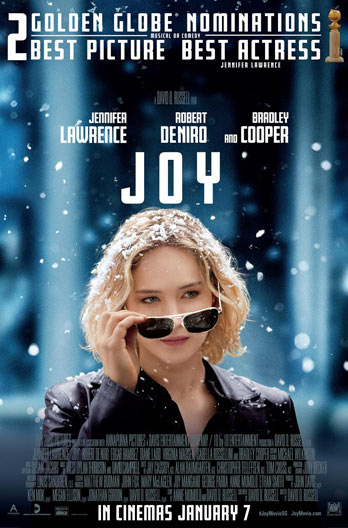
Movie Stills
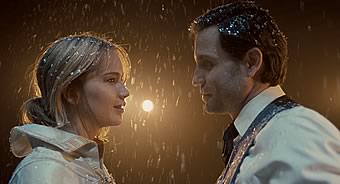
.Sub.02CC_R3.jpg)

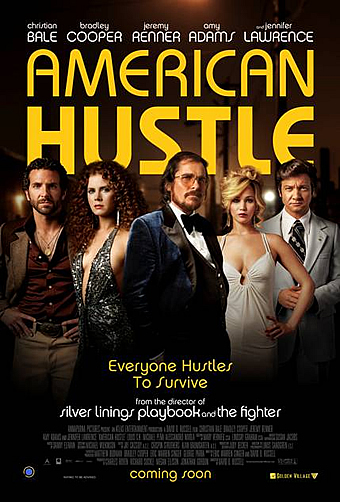
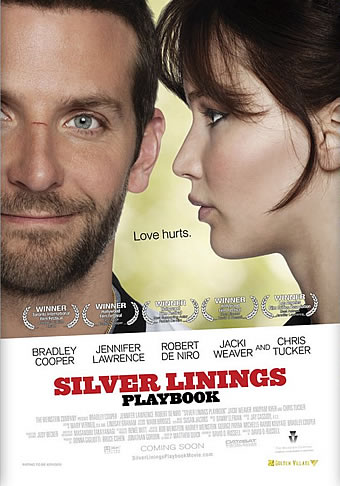
.jpg)
